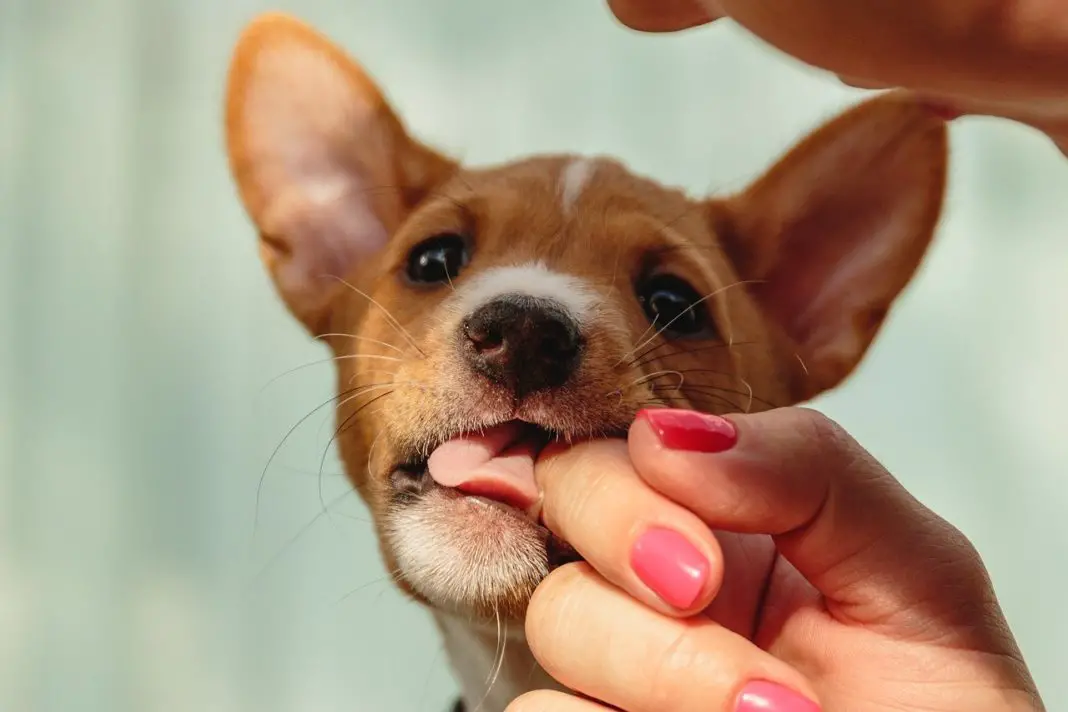8 Week Old Puppy With An Overbite?
If you look at your young puppy’s teeth, it’s possible that you’ll see a puppy overbite. The reason for this is that puppies are naturally born with a longer upper jaw to allow them to nurse.
The main reason why this happens is due to the lower jaw develops slower and typically goes through a growth spurt around the time a dog starts eating solid food. While this is normal for a puppy, if you’re checking out the teeth of an older dog, then there could be an issue with their teeth from when they were a puppy.
Will A Puppy Overbite Correct Itself
You may be wondering, “Will my 8 week old puppy’s overbite correct itself?” In some cases, it will. It’s important to know that most dogs are born with an overbite, which usually goes away as they get older.
A puppy that still has an overbite after six weeks of age can resolve the problem naturally as they grow, particularly if it is a mild case. Although, for an overbite correction to be successful, it’s critical to act while the puppy is still young.
If you wait too long and hope for the problem to resolve itself, it can become too late to do anything to help your puppy in the future. At this point of early identification, it’s important to get input from a veterinarian. They should be able to tell you if it’s safe to wait or not.
When Your Puppy Reaches 16 Weeks
If a puppy’s teeth come in too soon, it can lock the jaw in place, as the lower teeth won’t be able to move forward with the upper teeth blocking their growth.
If this is treated early, before 16 weeks of age, a vet may be able to remove the lower puppy canines, allowing the lower jaw to continue growing. After the procedure, it’s possible for the overbite to resolve itself, however, it’s not a guarantee.
Many grown dogs have an overbite with top teeth that sit forward over the teeth on their bottom jaw. It’s common for some breeds to have an overbite compared to others, and it can vary a lot in severity. If you think your young puppy has an overbite, we’ll look at the signs, symptoms and issues that come along with this condition.
The Problem With Overbites In Dogs
Usually, this misalignment is considered minor and cosmetic. All this means is that a dog wouldn’t qualify as a show dog but should not suffer from any health problems due to the overbite.
However, in a case like this, you would need to allow a vet to examine the dog to confirm whether this is the case. In fact, X-rays could be required to tell the true extent of the overbite, and if it will cause the dog any problems in the future. Unfortunately, in many cases, an overbite can be considered as a serious problem.
Understanding Your Puppies Overbite
Also referred to as parrot mouth, overshot and overjet, an overbite in puppies occurs when the upper jaw extends beyond the lower jaw. As the upper teeth overlap the lower row of teeth, this type of malocclusion prevents puppies from aligning their teeth snugly, as they should do. Breeds that are commonly affected by elongated muzzles are collies, shelties, dachshunds, and Russian wolfhounds.
Can A Puppies Overbite Cause Problems In The Longer Term?
While many are fine with their puppy’s condition, depending on the severity of the malocclusion, it’s possible for a puppy to encounter a few difficulties later on. While a minor overbite is a purely cosmetic concern, in some cases, puppies may have trouble chewing and injuries can even happen as a result of the lower teeth hitting the roof of the mouth. To ensure that your puppy’s teeth are growing correctly, it’s a good idea to have them thoroughly examined by your local vet once your puppy reaches 2 to 3 months of age.
Don’t Give Up Hope!
If your puppy’s overbite is causing you concern, it’s important to keep in mind that not all is lost, as your 8 week old puppy’s jaw is still developing. For example, a breed like the German shepherd can commonly have an overshot bite and there are cases where the teeth will spontaneously correct on its own as long as the gap between the upper and lower incisors is not greater than the head of a wooden match. Try to keep an eye on your puppy’s teeth, as improvement can sometimes take upwards of 10 months old when their jaw stops growing.








